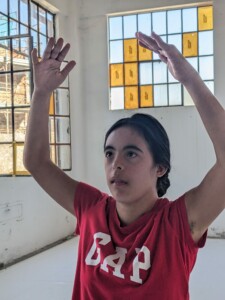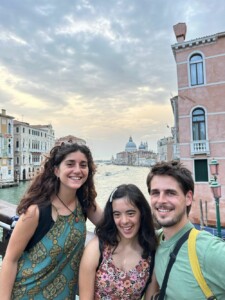Find the people that work best with you – interview with Angela Bettoni

As part of the Professional Media Presence (PMP) project artists from six different EU countries have the opportunity to experience artist residencies in Finland, Italy, Lapland, Spain and Croatia throughout the project. In April-May 2024 Angela Bettoni, performer, writer and an activist based in Malta, was one of the artists attending the residency in Italy. She is thrilled to share with us some snippets of the her experience.
During the residency, they basically brought me to the light. Thanks to them, I have become a new person, I see the pros and think of myself and my disability in a whole new light that I have never done before.
Hi Angela! Tell us a bit about yourself and who you are as an artist.
I am Angela, I am an advocate, a performer and a writer with Down’s Syndrome. And I am pushing for more mixed ability in art. Basically, what that means is to have more performances with the artists with or without disability, working alongside and performing equally together on a professional level.
You have been a member of the National Artist Team (NAT) in Malta from beginning of the PMP project: what made you choose to apply specifically for the residency in Italy?
It’s because I had this product monologued, based on my personal experience as a performer with Down’s Syndrome, and now I gave it a life on stage. So, first it was a space where I could vent out, and the monologue took shape in different imageries and through different movements. I wanted to do a mixed ability duet for some time. And then, when I went to a first PMP workshop week in Finland, I met Perypezye Urbane from Italy. I showed them my work and we really connected over that. Basically, that bridged the gap.
When I had the opportunity to apply for the residency in Venice, I had a project in mind as well as an inclusive choreographer and a professional non-disabled dance. Perypezye Urbane was very nice, saying that I could bring my dancer as well for the two weeks. In the two weeks that we were given, I got to explore and built up a performance based on my monologues and exploring words my text had. It was on how I see myself as a person with Down’s Syndrome. Basically, it was views on how I was unseen as a woman – for who I am. Perypezye Urbane gave us a space to grow and they also gave us two beautiful studios where we could really physicalize our thing. And one of them became my dramaturg – which meant that we could go deeper into the process.
Can you tell a bit more about the residency itself? How did your days look like?
So basically, that depended on what we were doing each day. In the first few days we stuck to the monologues and then we would work on the text – like what is beyond the text, what is the meaning behind it. Then I got the chance to share my own personal experiences and stories from my own life and from that – it was a gradual process on how to move myself away from the text. We realized we were all thinking too much about disability. I was literally beating myself up – because once I tapped into these things, I tapped into all of my emotions. That is why we moved away from the text to start implementing it physically.
We also took a day off to visit Venice and to get more inspired and to relax our minds a bit. So, we made a good balance during the residency when it comes to our work.
Then my dance partner came, and we got to physicalize and to put everything in the movement. At that point, we went through different levels of physical contact. That was really intense. We would spend the whole day working on this, from eight o’clock in the morning till six in the evening. My dream was coming to alive as I always wanted to do this and to experience it. All my dreams turned into reality during the residency!
They provided me with a space where I could really grow and flourish and develop along the way.
Since we were also living in a shared house, I got the opportunity to sharpen my own independent living skills as well, like I learned how to cook. In a way, it was also a good process where I got to work on my artistic skills, but also on my own daily living skills. I got to learn how to live more independently with support and empowerment from my dance partner and a choreographer. In overall, I would say the whole residency was a really inclusive environment where I could truly flourish and be myself. The team was excellent because of the amount of empowerment, and encouragement, motivation and inspiration. They provided me with a space where I could really grow and flourish and develop along the way.
If you have to pick one thing that you learned in Venice when it comes to yourself, what would you choose? And what did you learn about yourself as an artist?
I would say that now I am confident with myself. I was not comfortable with speaking and sharing about my feelings and I got scared to tap into that vulnerable state of being seen by other people. At first I was scared of that. I was trying to talk about stuff, and I was really stuck in my own mind, obsessing over my monologues. Then I realized that by doing this, I was hindering myself from moving forward. I was re-living all the bad experiences that the monologues were packed with. But then, the support from my team, and Giovanni, our dramaturg – really brought me out. During those two weeks of the residency, they basically brought me to the light. Thanks to them, I have become a new person now, where I see the pros and think of myself and my disability in a whole new light that I have never done before.
When you say that now you see yourself in a whole new light, thanks to the experiences and the people you were surrounded by during your residency, what do you mean by that?
For example, I accept that something has happened, but now it’s in the past. Now I don’t need to overthink anymore. I don’t need to be stuck in my mind. I just need to simply be present now – simply be in the moment, and to really connect on a heart-to-heart level, and not being afraid to be seen.

What was your favorite memory from this residency?
Venice!
Venice as a city? Venice as an energy? Or Venice as something else?
As an energy and a source of creativity. Then, Forte Marghera! I loved working in Forte Marghera, it was so magical! From the first time I saw the place in April, I fell in love with it. I was so happy the first day that I was back, this time for the residency. It really elevated me, and I felt at home.
One last question: what is the best advice you can give to other PMP artists when it comes to choosing the right residency for themselves?
Find the people that work best with you!
Follow on Instagram and Facebook:
@angelabettoni18 and Angela Bettoni
@prisms.malta and Prisms Malta
@perypezye and Perypezye Urbane
Text: Vesna Matic / Prisms Malta
Related article
My first Artist Residency as a young performer with Down Syndrome
